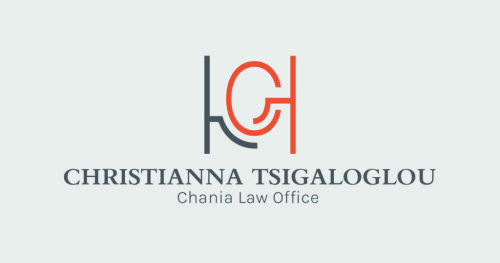Best Housing, Construction & Development Lawyers in Chania
Share your needs with us, get contacted by law firms.
Free. Takes 2 min.
Free Guide to Hiring a Real Estate Lawyer
List of the best lawyers in Chania, Greece
About Housing, Construction & Development Law in Chania, Greece
Chania, located on the island of Crete, is one of Greece's most attractive regions for real estate investment, residential projects, and commercial development. The legal landscape surrounding housing, construction, and property development in Chania is shaped by Greek national law, European Union directives, and specific local regulations. These laws address matters such as property ownership, building permits, urban planning, zoning regulations, construction standards, and the protection of cultural heritage. Because of Chania's unique blend of historic and modern urban environments, navigating the legal requirements can be complex for individuals, developers, and investors alike.
Why You May Need a Lawyer
There are many situations in which legal assistance is essential for individuals and businesses involved in housing, construction, or development in Chania. Common reasons to consult a lawyer include:
- Purchasing or selling real estate and verifying clear property titles
- Obtaining construction permits and ensuring compliance with building codes
- Resolving boundary disputes or disagreements over property rights
- Developing land and navigating zoning and urban planning regulations
- Dealing with issues related to co-ownership or shared properties
- Addressing issues arising from construction defects or delays
- Handling inheritance and succession of real estate assets
- Protecting, restoring, or developing properties with historic status
- Resolving disputes with contractors, architects, or engineers
- Managing lease agreements for residential or commercial properties
A qualified lawyer can help you avoid costly mistakes, ensure all legal requirements are met, and represent your interests in negotiations or court if needed.
Local Laws Overview
Legal matters relating to housing, construction, and development in Chania are governed by a combination of national and local laws. Here are key aspects to keep in mind:
- Urban Planning and Zoning: Local planning authorities in Chania strictly regulate land use, building height, density, and designated purposes of properties (residential, commercial, agricultural, protected, etc.).
- Building Permits: All construction, including new buildings, major renovations, additions, or demolitions, requires permits issued by the competent urban planning office. Unauthorized construction carries severe penalties.
- Property Ownership and Transfers: Greek law has specific requirements for the transfer of property, including due diligence to ensure clear titles and the use of notaries for valid transactions.
- Cultural Heritage Protection: Many properties in Chania are near archaeological sites or are themselves historically significant. Special rules apply for construction or restoration work on such properties, often involving multiple governmental approvals.
- Environmental Regulations: Building near the coastlines, forests, or environmentally sensitive areas can involve additional restrictions and require environmental impact assessments.
- Co-ownership and Condominiums: Rules governing shared spaces, common areas, and co-owners' rights and obligations are detailed in Greek civil law, with additional local regulations for multi-unit buildings.
- Energy Efficiency: New regulations require certain standards of energy efficiency in all new developments and major renovations.
Frequently Asked Questions
Do I need a permit to build, renovate, or extend a property in Chania?
Yes, almost all construction activities require a permit from the local urban planning office. This applies to new constructions, major renovations, structural changes, and extensions.
How can I check if a property title is clear?
You should conduct a title search at the local Land Registry (Ktimatologio) and consult with a lawyer or notary to ensure there are no liens, mortgages, or existing disputes regarding the property.
Are there restrictions on foreigners buying property in Chania?
EU citizens face almost no restrictions when purchasing property in Greece. Non-EU nationals can generally buy property, but some limitations may apply, especially for properties near border areas, which may require special permits.
What are the main steps for transferring property ownership?
The process includes a title search, drafting and signing a sale contract with a notary, paying relevant taxes and fees, and registering the transaction at the Land Registry.
What happens if I build without a permit?
Unauthorized construction is subject to fines, legal action, and possible demolition orders. In some cases, legalization procedures may be available, but these are not guaranteed and involve significant costs.
How are construction disputes with contractors resolved?
Disputes can often be resolved through negotiation or mediation. If these options fail, legal proceedings before Greek courts may become necessary. Contractual documents and building permits are crucial evidence.
Can I develop land near archaeological sites or protected areas?
Special restrictions and approvals apply to construction near archaeological sites, traditional settlements, or environmentally protected zones. Multiple agencies may need to approve your plans.
What taxes and fees are associated with property transactions?
Buyers typically pay property transfer tax, notary fees, registration fees, and sometimes Value Added Tax (VAT) for new constructions. Sellers may have to pay capital gains tax.
What are my rights as a co-owner in a shared building?
Co-owners' rights and obligations are regulated by Greek law, the property's statutes, and sometimes, additional agreements. Matters such as shared expenses, maintenance, and use of common areas are covered.
How can I ensure my building complies with energy efficiency requirements?
You need to engage certified engineers or architects to design and execute work in line with current regulations. Energy performance certificates are mandatory for all new buildings and when selling or leasing property.
Additional Resources
For further information or support regarding housing, construction, and development in Chania, consider consulting the following:
- Chania Urban Planning Office - Handles building permits and urban planning matters locally.
- Land Registry (Ktimatologio) - For property title searches and registration of ownership.
- Technical Chamber of Greece (TEE) - Professional body for architects and engineers, provides regulated professionals lists.
- Greek Ministry of Environment and Energy - For environmental, building regulations, and energy efficiency standards.
- Bar Association of Chania - Directory of qualified local lawyers specializing in property and construction law.
- Greek National Tourism Organization (GNTO) - For regulations related to developing properties intended for tourism use.
Next Steps
If you are considering any housing, construction, or development project in Chania, it is wise to:
- Contact a local lawyer experienced in real estate and construction law to review your situation and advise on necessary procedures.
- Conduct proper due diligence with the help of qualified professionals, such as notaries, engineers, or architects.
- Reach out to the local urban planning office and Land Registry for guidance on permits, property status, and official processes.
- Gather and prepare all required documentation, including title deeds, site plans, proof of tax payments, and engineering reports before starting any transaction or construction activity.
- Maintain open communication with relevant local authorities, professionals, and co-owners to ensure a smooth and lawful process.
Taking these steps will help protect your interests, avoid legal pitfalls, and ensure your housing, construction, or development project in Chania runs as smoothly as possible.
Lawzana helps you find the best lawyers and law firms in Chania through a curated and pre-screened list of qualified legal professionals. Our platform offers rankings and detailed profiles of attorneys and law firms, allowing you to compare based on practice areas, including Housing, Construction & Development, experience, and client feedback.
Each profile includes a description of the firm's areas of practice, client reviews, team members and partners, year of establishment, spoken languages, office locations, contact information, social media presence, and any published articles or resources. Most firms on our platform speak English and are experienced in both local and international legal matters.
Get a quote from top-rated law firms in Chania, Greece — quickly, securely, and without unnecessary hassle.
Disclaimer:
The information provided on this page is for general informational purposes only and does not constitute legal advice. While we strive to ensure the accuracy and relevance of the content, legal information may change over time, and interpretations of the law can vary. You should always consult with a qualified legal professional for advice specific to your situation.
We disclaim all liability for actions taken or not taken based on the content of this page. If you believe any information is incorrect or outdated, please contact us, and we will review and update it where appropriate.











